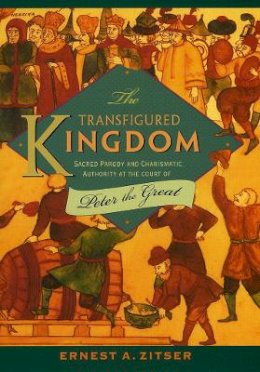
The Transfigured Kingdom: Sacred Parody and Charismatic Authority at the Court of Peter the Great
Ernest A. Zitser
In this richly comparative analysis of late Muscovite and early Imperial court culture, Ernest A. Zitser provides a corrective to the secular bias of the scholarly literature about the reforms of Peter the Great. Zitser demonstrates that the tsar's supposedly "secularizing" reforms rested on a fundamentally religious conception of his personal political mission. In particular, Zitser shows that the carnivalesque (and often obscene) activities of the so-called Most Comical All-Drunken Council served as a type of Baroque political sacrament—a monarchical rite of power that elevated the tsar's person above normal men, guaranteed his prerogative over church affairs, and bound the participants into a community of believers in his God-given authority ("charisma"). The author suggests that by implicating Peter's "royal priesthood" in taboo-breaking, libertine ceremonies, the organizers of such "sacred parodies" inducted select members of the Russian political elite into a new system of distinctions between nobility and baseness, sacrality and profanity, tradition and modernity.
Tracing the ways in which the tsar and his courtiers appropriated aspects of Muscovite and European traditions to suit their needs and aspirations, The Transfigured Kingdom offers one of the first discussions of the gendered nature of political power at the court of Russia's self-proclaimed "Father of the Fatherland" and reveals the role of symbolism, myth, and ritual in shaping political order in early modern Europe.
Product Details
About Ernest A. Zitser
Reviews for The Transfigured Kingdom: Sacred Parody and Charismatic Authority at the Court of Peter the Great
Journal of European Studies
Ernest Zitser has produced an innovative new study of the transformation of political discourse during the reign of Peter the Great... Zitser's study relies on the personal letters of Peter the Great, eyewitness accounts, official administrative documents, and visual representations, such as engravings, paintings, and drawings. These rich sources allow Zitser to present a more nuanced understanding of Petrine political discourse and the use of 'self-conscious and ironic wordplay' by Peter and his courtiers. The result is a fascinating, well-written, creative new interpretation of Peter's parodies and spectacles, one that is both accessible to an undergraduate audience and essential reading for Russian history scholars.
Russian Review
Some of the strangest and most puzzling aspects of the reign of Peter the Great of Russia involve the play armies, mock religious processions, and other carnivalesque spectacles staged at the royal court throughout Peter's long reign.... Zitser argues that the activities of institutions such as the Most Comical All-Drunken Council were crucial elements in an attempt to elevate the tsar's persona above court factions and clan politics, as well as to establish his domination over ecclesiastical affairs. Zitser focuses his attention on the language used by the tsar and his entourage to transform a medieval Muscovy into a modern, imperial Russia, while also emphasizing the connections of the spectacles and rhetoric with the pan-European baroque court culture of early modern Europe.
Choice
The Transfigured Kingdom... is a highly original effort to decrypt the coded messages conveyed by ceremonial events at Peter's court.... Ernest Zitser takes us on an enjoyable romp through the arcane mysteries of Imperial merrymaking.
Times Literary Supplement
Zitser's study is based on a range of sources impressive for both its variety and breadth: hitherto unprocessed personal and state archives; dispatches and accounts of foreign diplomats; publications of official government papers; monographic studies in many languages; contemporary engravings and illustrations. All the forms of evidence, facts, and events are subjected to thorough-going analysis in order to reveal their communicative and symbolic content.... Zitser's book is extraordinarily interesting and results in original reflections about the reign of Peter I and his contemporary cultural world.
The New Review/Novyi Zhurnal
